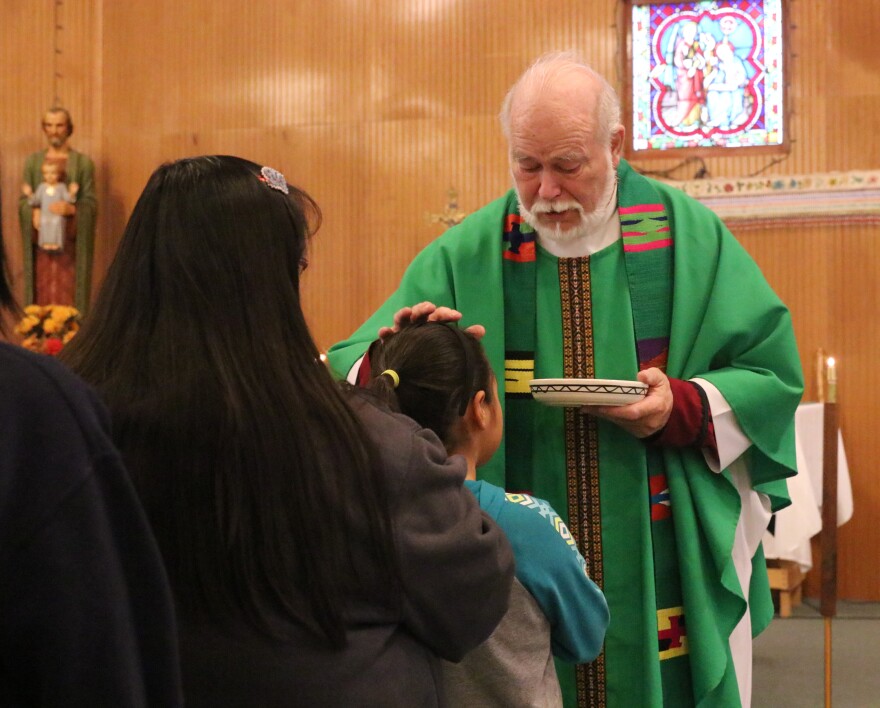On Sunday, Bethel said farewell to Father Chuck Peterson. The Jesuit Catholic priest began serving in the Yukon-Kuskokwim Delta in the 1970s, and spent decades building the local, indigenous leadership of the church. Following a series of health issues, including an incident of severe bleeding outside his brain, the church is transferring Father Chuck to California. The priest sat down with KYUK before he left.

Before Charles Peterson became Father Chuck, he was an altar boy in the 1950s at a Catholic Church in Missoula, Montana. And though he loved the Mass and the liturgy, he felt discontent.
“I was sad that there was only one priest and two altar boys that said everything, and the rest of the people were out in the seats all saying their rosaries,” he said.
This was when the priest would recite the Mass in Latin with his back turned to the congregation.
“And I said, ‘Geez, why do we have to have two worlds here: the Latin world and then the English world?'”
A decade later the Church would make sweeping changes under the Second Vatican Council. Priests began facing the parish, speaking in their same language, and lay people began to participate in services.

Father Chuck’s desire to merge worlds would stay with him through his decades working in the Yukon-Kuskokwim Delta.
But he didn’t know that yet. What 17-year-old Charles Peterson did come to know was that he wanted to become a priest.
“Sometimes I like to compare it to 'Why does someone fall in love with a person?'” he said. “It just happened.”
Particularly, Charles was attracted to the Jesuit order, and to Alaska, where only Jesuit priests served.
“I said, 'I want to join that outfit.'"
Father Chuck’s dream came true. He was ordained, and by the time he was 24 he was teaching at the Anchorage Copper Valley Catholic Boarding School. And that summer of 1964, the church sent him to Bethel to teach catechism.

“And I didn’t know squat about catechism,” said Father Chuck, “and luckily there was a flood in Bethel, so I just wound up helping tie in boardwalks and rowing back and forth from the church.”
A few years later, in 1970, he returned to Bethel as co-pastor.
“And I loved it!”
The priest, by then known as "Father Chuck," joined the city league basketball, volunteered for the Fire Department, and made a controversial decision to celebrate the Mass in Yup’ik.
That action began his mission of building Yup’ik leadership within the Catholic Church. Soon there were Alaska Native Deacons.

“The first one to be ordained was Alvin Owletuk of Marshall. Since then there have been, I think, about 50,” said Father Chuck.
The deacons wear qaspeqs instead of Western robes and perform services in Yup’ik.
In the 1990s Father Chuck was transferred to Indian Country in the Pacific Northwest.
He says that the entire time, he kept asking to return to Bethel. In 2005, the Church granted his request.
“I saw a real morale problem up here,” said Father Chuck.

The Church had been rocked nationwide by revelations concerning sexual abuses committed by priests, and the scandal hit hard in Alaska.
“And I wanted to come back to Alaska so I could participate in getting our morale back,” said the priest.
Since then, Father Chuck has worked to heal the harm and rebuild the Church.
Now, he's been transferred again. At age 78, he has been sent to serve as chaplain at a home for older and infirm Jesuit priests in San Jose, California. But he still wants to return to Bethel.
“And when I do, I’m really wanting to see, dream of dreams, a Yup'ik priesthood,” said Father Chuck.

He would like to see a Church more closely tied to the traditional Native culture, Yup'ik women serving as deacons, and a Yup'ik priesthood allowed to marry.
“And I realistically don’t feel it can be completed in my lifetime, but I want to promote it as much as I can: a Yup’ik priesthood in the Catholic Church. Heck, I’d like to see a Yup’ik bishop, too.”
Listen to the radio version of this story (listed above) to hear community members share memories and say farewell to Father Chuck.




